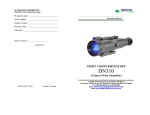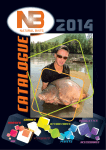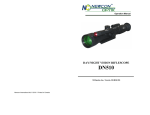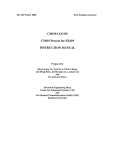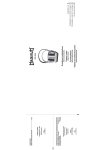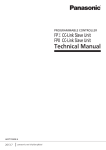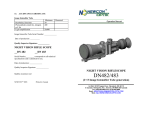Download Canon NVD-NORS210 Specifications
Transcript
Features • High quality, full screen image • Internally lighted red reticle • Shock resistant on large caliber (inc. .375H&H, .416Rigby) • Lighted, high-power optics • Image protection from lateral and dot light sources • Long eye relief • Maintains rifle’s zero at adjustment of focus • Built-in high-power (75mW), hazard-free IR illuminator with adjustable power • Precision internal windage/elevation adjustment • Camera/and camcorder/adaptable • Various mount • Water resistance • Low power consumption • Compact/Light weight NVD-NORS210 NVD-NORS220 NIGHTVISION RIFLESCOPES (Generation Super I+) OPERATIONAL MANUAL Rules of usage, mounting to a rifle and storage to maximize feature benefits of rifle scope Infringement of the rules of storage, adaptation and utilization of the device as stated in the operation manual may be a cause for cancellation of the warranty obligations of the manufacturer. Contents Features Appearance of the device Overview Specifications Utilization of 2x magnifier lens Components Installation of batteries Testing of operation during daytime Utilization of the device in dark time Adaptation to a hunter’s rifle Dimensions of the reticle Adjustment of the scope on the rifle Taking photos and video shooting Maintenance and storage rules Troubleshooting Warranty Acceptance certificate Appearance of the Devices With objective 64mmF/1.2 NVD-NORS210 6 5 2 1 2 3 3 4 4 4 4 5 5 8 8 8 9 9 10 10 7 3 11 1 4 With Objective 100mm/1:1.5 NVD-NORS220 6 2 5 7 11 1 NVD-NORS210 3 4 NVD-NORS220 12 8 9 10 8 9 10 1 - Body of the device 2 – Objective lens 3 – Eyepiece lens 4 - Rubber eyepiece guard 5 - Battery compartment 6 - IR illuminator 7 - Horizontal/Vertical adjustment handle of the reticle 8 - On /Off /power alteration switch of the IR illuminator 9 - Brightness adjustment of the reticle 10 - Objective focusing handle 11 - Rifle mount 12 - Objective cover Overview Your NVD-NORS210 Night Vision Scope is a modern, universal night vision device designed for a wide range of activities from professional to amateur activity: • Night observation and hunting • Patrolling and safeguarding • Rescuing and searching works • Night photo and video shooting. The device is equipped with a First plus Generation highquality electronic-optical image intensifier (Gen. Super I+) employing the principle of multiple intensification of the image brightness in the visible and IR radiation which guarantees an up to 150-350 m observation range. NOTE. Observation and identification range provided by the device depends on the value of natural night light, type of the objective lens used, transparency of the atmosphere and contrast between the target and background. The identification range increases in the conditions of good lighting, at moonlight night given outside illumination, if the target is situated on a light background (sand, snow). The identification range decreases in the conditions of weak lighting, low transparency of the atmosphere, if the target is situated on the dark background (plough-land, stems of trees, etc.). The mechanical Overall dimensions, mm Length Width Height Weight, g Electrical parameters Power source – battery of the type AA Feed Voltage, V Battery Life, h -in a passive mode -in an active mode Electronic-optical image intensifier tube Type Photocathode sensivity,µA/Lm Gain Resolution, Lp/mm Infra-Red illuminator Type Power of light radiation, mW Angle of radiation, degree Wave length , nm Conditions of work Range of working temperatures Relative humidity 240 80 78 790 270 100 78 870 2pc. 3 min. 60 5 Gen. Super I+ min.280 min.1000 min.45 IR diode 75 8-10 805 -40° up to +50°C 0 to 98% Specifications General Magnification, x Field of view, degree NVD-NORS210 NVD-NORS220 1.6 (3.2*) 2.5 17 (9*) 11 Objective Focal length, mm F-number Focus range 64 (128) 100 1:1.2 1:1.5 10m to infinity Eyepiece Focal length, mm Eye Relief Distance Diopter setting 16 45 +4, -4 (*) - with 2x magnifier lens. P.S. 1. The screen may have separate black dots or small groups of dots allowed by the technology of tubes’ production at the manufacturing plants. Utilization of 2x Magnifier Lens Installation of Batteries Your NVD-NORS210 (type equipped with the objective 64mmF/1.2) can be used with an optical 2x magnification lens in order to obtain doubled magnification. The lens (identified as 2x) doubles focal length of the objective. It is fixed on a setting thread under the light filter of the objective (outer side of the objective). To take off a cover (12) from the body of the device (1). The 2x lens must be tightly fixed screwing it to the rest. NOTES. When 2x magnification lens is used in an active mode (with IR illuminator) partial darkening of the field of view will be observed, since the 2x lens has a large diameter of the objective. In order to avoid this effect (in case of simultaneous utilization of the device with IR illuminator and 2x lens) it is recommended to order the device with Z-like form of the illuminator. When a 2x lens is ordered for the device with already implemented adaptation for a rifle, the opportunity of installment of 2x lens should be checked, since its diameter exceeds the diameter of the objective and equals 80mm. Components Your NVD-NORS210 (NVD-NORS220) is delivered with the following components: -Device 1pc -Lens cap 1pc -Built-in IR illuminator 75 mW 1pc -Rubber Eyepiece Guard 1pc -Adaptor rail (Standard prism or Weaver type) 1pc -Camera/video adapter ring (52mm/37mm) 2pc -Operation manual 1pc -Carrying Case 1pc. Additional accessories (not included in a standard set): -2x Magnification Lens (for NVD-NORS210 only) Your NVD-NORS210/220 works from two AA batteries. Be sure that the batteries are in good condition and they are installed in accordance with the picture on the battery compartment. To replace the batteries it is necessary to turn off the unit, remove the cover of the battery compartment and replace old batteries with new ones, keeping polarity of the batteries. NOTE. To ensure the longest operation time of the device and full power of the IR illuminator (using one set of batteries) it is recommended to use alkaline batteries. These batteries possess the most stable characteristics of a current consumption when their power capacity is reduced. Testing of Operation in Daytime In order to test operation of the device you can turn it on with the closed cover in daytime. Cover of the device has a hole small enough to test the operating condition of the device. When the device is turned on the observed picture appears on the screen in a yellow-green color. NOTE. The device won’t burn out even if you open the cover of the objective. When the light is excessively bright protection will be activated and the image will curtail. When the device is placed in a dark place the image will be restored in several seconds. CAUTION. The device is not supposed to be directed toward bright sources of light: bright lamps, the sun, welding and etc – it may result in the reduction of the coefficient of brightness magnification of the device. In order to avoid the fatigue of photo- cathode, it is not allowed to leave the device motionless in a turned on condition in the excessively bright environment (in the morning, in the evening, in a daytime) for more than 30 minutes. Utilization of the Device in Dark Time 1. Open the cover of the objective lens. 2. Turn on the device – position ON of the switch (8). Green light should appear on the screen (passive mode). 3. Turning the eyepiece (3) reach the sharpest image of the mark. 4. Choose the object of observation and focus the objective of the device with the handle (10) until you see a distinct and sharp image of the observed object. 5. When illumination of the observed object is required, turn on (8) the IR illuminator (active mode). You can select one of the three positions changing the illuminator’s power (10, 35 or 75 mW). 6. Having finished the work, turn the ON / OFF switch (8) to the OFF position. 7. Close the cover of the objective after you have finished the work of the device. RECOMMENDATION. When the device is stored for a long time it is recommended not to leave batteries in the compartment of the device in order to avoid leakage of the batteries. Adaptation to a Hunter’s Rifle Your night vision scope NVD-NORS210/220 can be used as a hunter’s night vision scope. RECOMMENDATION. We recommend you verify the order of usage of the hunter’s scope on your rifle with the local competent authorities. Your night vision scope NVD-NORS210/220 can be used with different types of mountings, providing reliable fixation of the device on the particular rifles. Manufacturers of civil rifles do not possess uniform standards for a mounting place of optical devices, and as a result, a universal fastening device is not available. Dedal-210 is supplied with a fastening mount without hard fastening to the body, in most cases allowing the performance of special adaptation of the device for a particular model of rifles. For this purpose you should address a specialized rifle workshop or implement the fastening yourself, if you possess enough knowledge of the system. The NVDNORS210/220 are shipped with a standard Weaver mount rail system. If this works with your system, move to the Variant II Section. Adaptation rules. Variant I – Adapter rail with Standard Prism type. Fastening of the device is made with the help of the following parts: DO NOT FORGET TO TURN OFF THE DEVICE AFTER USE! 1- body of the device 2- front feet with of the Standard prism 3- rear feet with the Standard prism 4- adaptor rail with Standard prism 5- fastening screws 6- transverse screws. The front and rear feet (2,3) with transverse screws (6) are standard feet with standard prism (4). They are produced by the companies manufacturing scopes mounts (for example, Ernst Apel Gmbh, Germany)). - The following types of rails are recommended: SP200-64 - for the device NVD-NORS210 with objective 64mm, SP200-100 - for the device NVD-NORS220 with objective 100mm or NVD-NORS210 + 2x Magnification Lens. NOTE. The rails SP200-64, SP200-100 move the device back. This is necessary for some rifles for comfortable use. Adaptation of the device is performed in consistency with the following rules: - Check the elevation of the fastening screws (5), pulling the rail (4) to the body of the device (1) above the upper surface of the rail. The height of elevation must not exceed 3.0mm and must not be less than 2.5mm. It is especially important when the body of the device has a blind aperture with a thread (front hole for the device with a 64mm objective). The elevation should not exceed 3.5mm for through holes and should not be less than 2.5mm. This requirement can be met by cutting axle length of the screws from the side of the thread; - Screw off screws (6) from feets (2,3); - Fix the feets (2,3) to the rail (4). Fasten the feets (2,3) to the rifle. Moving the rail in the feets find such a position of the device when your eye reaches the edge of the Eyepiece Guard or in case of a large caliber (for example, .375 H&H Mag) your eye should be situated at the distance of 2-5cm from the edge of the rubber eyepiece Guard. The device should be located in the - - - position which allows comfortable observation without stretching forward; Screw the screws (6) in supports (2,3) from the opposite side to fix the selected position of supports (2,3) at the rail (4); Drill the rail(4)at the place of disposition of screws(6) using supports (2,3)as conductor. Control the depth of drilling not to damage screws (it is desirable to use a special accommodation of the firm Ernst Apel (Ref.22000)); Cut an excessive part of the rail (4); Screw off screws(6) and twirl them in regular position into perforated holes through supports (2,3). Fasten screws (6) with the fixed composition; Remove fat from the surface (A)of the rail and from the body of device at the place that will be glued; Prepare the glue (glue is needed, for example, epoxy with the tear strength not less than 200kg/cm2) according to its preparation instruction, and put it on the surface (A) of the rail. The surface of the screws should not have any glue. This condition is of a considerable importance, since it provides an opportunity to repair the device and remove the alignment rail for further adaptation to another rifle; Apply a hermetic substance (of silicone type) on the thread of the screws (5). It is necessary to exclude the hit of moist air into the device and to avoid sweat of it; Fix the rail (4) to the body of the scope with the help of the screws (5) cut at the required length; Remove glue surpluses appeared in the place of alignment of the plate with the body with a dry napkin and let the glue solidify in accordance with its instruction (for example, 24 hours in case of epoxy glue). Adaptation has been completed and the device is ready for use as a hunter’s scope. Variant II – Adapter rail with 7/8’’ Weaver prism type. Fastening of the device is made with the help of the following parts: 1-body of the device 2-fastening screws 3-adapter rail with 7/8’’ Weaver prism encompassing: 4-insert rest 5-insert 6-clamp 7-clamp screw. All parts of the alignment are supplied by JSC Dedal-NV. The following types of rails are recommended: WP135-64 - for the NVD-NORS210 with standard objective 64mm, WP150-100 - for the NVD-NORS220 with standard objective 100mm or for the NVD-NORS210 with objective 64mm + 2x Magnification Lens. WP90-64 - for the device with objective 64mm or with objective 100mm (NORS210 or NVD-NORS220). NOTE. The mounts WP135-64, WP150-100 move the device back, which is necessary for some rifles for comfortable supervision. Adaptation of the device is performed in consistency with the following rules: - Check the elevation of the fastening screws (2), pulling the rail (3) to the body of the device (1) above the upper surface of the rail. The height of elevation must not exceed 3.0mm and must not be less than 2.5mm. It is especially important when the body of the device has a blind aperture with a thread (front hole for the device with a 64 mm objective). The elevation should not exceed 3.5mm for through holes and should not be less than 2.5mm. This requirement can be met by cutting axle length of the screws from the side of the thread; - Remove fat from the surface (A)of the rail and from the body of device at the place that will be glued; - Prepare the glue (glue is needed, for example, epoxy with the tear strength not less than 200kg/cm2) according to its preparation instruction, and put it on the surface (A) of the plate. The surface of the screws should not have any glue. This condition is of a considerable importance, since it provides an opportunity to repair the device and remove the alignment plate for further adaptation to another rifle; - Apply a hermetic substance (of silicone type) on the thread of the screws (2); - Fix the rail to the body of the scope with the help of the screws (2) cut at the required length; - Remove glue surpluses appeared in the place of alignment of the rail with the body with a dry napkin and let the glue solidify in accordance with its instruction (for example, 24 hours in case of epoxy glue); - Place the scope on the rail of the rifle in such a position when your eye coincides with the edge of the Eyepiece Guard or in case of a large caliber (for example, .375 H&H Mag) your eye should be situated at the distance of 2-5cm from the edge of the Eyepiece Guard. The device should be located in the position - - which allows comfortable observation without stretching forward; Place inserts (4,5) in the apertures of the rail (3). The insert (4) is placed with a projection (B) looking downwards in the nearest slot on the rail of the rifle. If there is no such a slot, the insert (4) is placed with a projection (B) looking upwards. It is recommended to place the inserts at the maximum possible distance from each other; Place clamps (6) and clamp screws (7) in the inserts (4,5). Tighten screws (6,7) in order to obtain hard fixation. When necessary the excessive front part of the rail (3) can be removed. Adaptation has been completed and the device is ready for use as a hunter’s scope. Dimensions of the Reticle Type of the reticle is presented at the drawing. Brightness of reticle can be regulated with toggle switch (9). Dimensions are given in meters for the distance 100m for the objective 64mm (NVDNORS210) Dimensions in brackets are given for the objective 100mm (NVDNORS220) Adjustment of the scope can be performed in daytime with the closed cover of the objective or in the twilight on the adjusted target or on the remote point. Adjustment of the scope is performed in the following way: - Fix the scope on the fit of the rifle; - Set a panel with a target or select the point of aiming; - Set the rifle on the scoped machine; - Direct the rifle to the point of aiming by mechanical sight (bead with a slot) (if it is possible). At this stage it is suitable to apply laser of cold test shooting (LCTS) inserted in the barrel of the rifle, which indicates geometrical point of the barrel position. - Unscrew the protective caps of the bias screws of the aimed graticule. Turning the bias screws of the reticle obtain the matching of reticle crosshairs with the aimed point, set by the mechanical sight or LCTS; - Remove the rifle from scoped machine and take out LCTS; - Make 2-3 shots. Having examined the target make necessary corrections (for example, in order to move the hit point downwards and leftwards, screws of the mechanism should be turned counter clockwise, in the directions Down and Left correspondingly. The aiming point is moving upwards and rightwards); - Make a control shot and find out whether the aiming point coincides with the bullet hit point. (Make the correction again if necessary); - Set the protective caps into their places. The device is ready for operation. Performing the adjustment it should be taken into consideration that the displacement mechanism of the reticle of the device is equipped with a clicking fixer providing the following presented characteristics: Focal length of objective lens 64mm 100mm Displacement of the reticle at the turn of the screw for one click at a distance of 100m 30mm 19mm Adjustment of the Scope on the Rifle Before the adjustment of the scope, objective lens should be adjusted for a distant object (select infinity) in a dark time with the opened cover of the objective. Taking Photos and Video Shooting Your NVD-NORS210/220 comes with the photo/video adapter allowing for night photo/video shooting. Night photo shooting with the device NVD-NORS210/220 is easily performed with application of mirror 35mm SLR cameras (Nikon, Canon, Pentax etc) with standard objectives that have the focal length of 50-58 mm. Preparation of the device for photo shooting: - Screw the adapter ring supplied in the set (diameter 52mm or 37mm) to the rest into the setting place of the light filter of the objective in your camera. (If the objective of your camera has another setting diameter for a light filter (for example, 49mm or 58mm) your have to purchase adapter rings from the size of 52mm to your size); - Remove the rubber eyepiece guard from the scope; - Set the eyepiece in the medium position; - Fix the adapter ring with a camera on the cylindrical belt of the eyepiece body; - Switch on the device and focus the assembled system with the help of the objectives of the device and camera. If the image cannot be focused the camera with the ring should be removed and the coupling of the eyepiece of the device should be turned a little. Assemble the system again and check its focusing. At some position of the eyepiece and objective of the camera the system will be focused exactly; - Fasten the adapter ring with the camera to the body of the eyepiece of the device with the help of three blocking screws. During further photo shooting sharpness of the system is obtained with the help of the objective of the device only; - Set diaphragm on the objective of the camera equal 2.8 or 4 (shooting is possible even at lower diaphragm indices, for example 2, but the obtained pictures will have worse resolution). Taking photos with a completely opened diaphragm of the objective is justified for the shooting of quickly moving objects only. The TTL system, which is installed at most mirror prism cameras easily estimate exposure during the shooting with the device. If your camera is not equipped with the TTL system, the table can approximately estimate the shutter speed at the diaphragm number of the camera equal 2.0: ISO 50 100 200 Shutter speed, sec. 1 1/4 1/2 400 1/8 800 1600 1/15 1/30 3200 1/60 NOTES. Use a film ISO 400 or more. Application of a tripod is strongly recommended for achievement of higher quality of photos. VIDEO Maintenance and Storage Rules Device maintenance and storage rules are very simple: Keep and carry the device in a closed box with a cover put on the objective. Protect the device from hits and direct influence of rain, snow and dust on the optical parts. Protect the box from moisture penetration and the device should be protected from direct sun influence. The device should be kept in a warm dry place far from heating devices. Batteries should be taken out. Storage temperature must not exceed 60°C. NVD-NORS210/220 does not work . . . Make sure that the batteries have been installed and they are in good condition. NVD-NORS210/220 cannot be focused . . . Adjust the objective lens and eyepiece according to the instructions specified in the Operation section. If the device is not still focusing wipe and clean the optical parts. The image has faded or disappeared completely . . . Bright source of light can be a reason of the image reduction, loss of resolution or complete disappearance. If NVD-NORS210/220 has been switched off automatically, turn the switch to the position OFF. The unit will be ready for use in one-two seconds. Condensation effect . . . In order to avoid misting of the eyepiece lens in cold time use special anti-damping covers (for example, for spectacles). Some black dots are on the screen . . . The image may contain small black dots or groups of black dots. Most of black dots can be seen only in daytime and in the operation mode the dots become almost invisible. Bright points are on the screen . . . The image may contain some bright points caused by gradual relief of static electricity from the cathode. This feature may appear immediately after the assembly of the device and removal/setting of the objective from/to the device, and it always disappears in 5-14 days of the device utilization (storage). Koflar I/S Toften 40 9280 Storvorde Denmark Phone: +45 9831 0496 / +45 2976 0499 Fax: +45 9831 0497 Email: [email protected] web : www.nightvision.dk www.redliv.com










